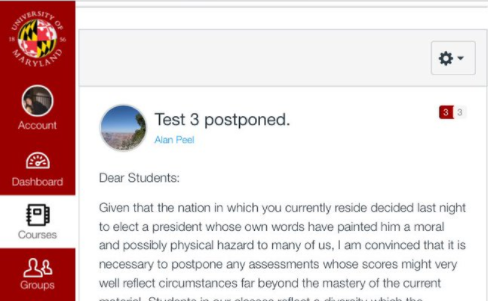Many students exhibited stress and anxiety after the unexpected results of the presidential election on Nov. 8, and some University of Maryland professors took note.
Several professors at this university opted to give students more time to complete assignments that were due shortly after the election. After a letter he sent to his students became national news, Alan Peel, an astronomy lecturer, chose not to speak in an interview with The Diamondback, but agreed to share the reason why he postponed an exam in one of his classes.
“The letter I sent students has been widely and sometimes erroneously interpreted to mean something about my political leanings, which are not relevant to my work at the University,” Peel wrote in an email. “But, the message to students was not phrased that way -— which I think you can see if you carefully re-read it. In point of fact, I was responding to what I thought might be some students’ perceptions about their own safety, regardless of politics.
“The test was merely postponed until the next class lecture period two days later. Tests are fairly frequently postponed for far less interesting reasons,” Peel wrote.
In his original message sent to students via ELMS, Peel said he thought it was necessary to postpone the test, “given that the nation in which you currently reside decided last night to elect a president whose own words have painted him a moral and physical hazard to many of us.”
He added that he was concerned that exam scores would “reflect circumstances far beyond the mastery of the current material,” Peel wrote in the ELMS message.
Agriculture and resource economics professor Kenneth Leonard said his decision to postpone a world hunger, population and food supplies exam originally scheduled for last Wednesday was not a “political statement.” But after students began to email him with concerns they would not be able to study properly as the results were coming in, Leonard said he made the decision that was best for his students.
“I recognize that many of you did not have a fruitful day of studying for the next exam,” read an ELMS announcement sent at about 11 p.m. on Tuesday. “No matter what happens, we will all be OK, but if you can’t take your eyes off the coverage, I understand.”
Leonard said several students emailed him thanking him.
“I could clearly tell that nobody was going to be thinking about anything else,” Leonard said. “I wanted to remind students life doesn’t stop, but eight hours later, 10 hours later, that’s not the answer students want to hear.”
But for communication professor Jon Hoffman, the choice to cancel his Wednesday class was personal.
“When we finally got the call, I needed the day to collect myself,” Hoffman said.
Hoffman, who teaches courses in digital media and democracy, said he decided to change his Thursday lecture into an open discussion so students could voice their thoughts about a Donald Trump presidency.
“On Thursday I couldn’t ignore what happened, I was debating it all morning so I decided to start class by talking about what happened and related it to some class concepts like social media,” Hoffman said. “I was creating a space for students to talk about concerns and fears, some of which I feel personally.”
Jennifer Wessel, a social psychology professor, sent an ELMS message to students on Nov. 10 regarding noticeably lower grades on a quiz taken by half the class before the election and taken by the other half on Nov. 10.
Wessel offered to give students back some points, noting that it has been “a particularly tumultuous and disruptive week for many.”
Wessel also wrote that her office hours were available to hear the thoughts of students who needed to talk about anything that was bothering them.
“I am willing to listen if you need a faculty member to hear you with an open mind,” Wessel wrote.



